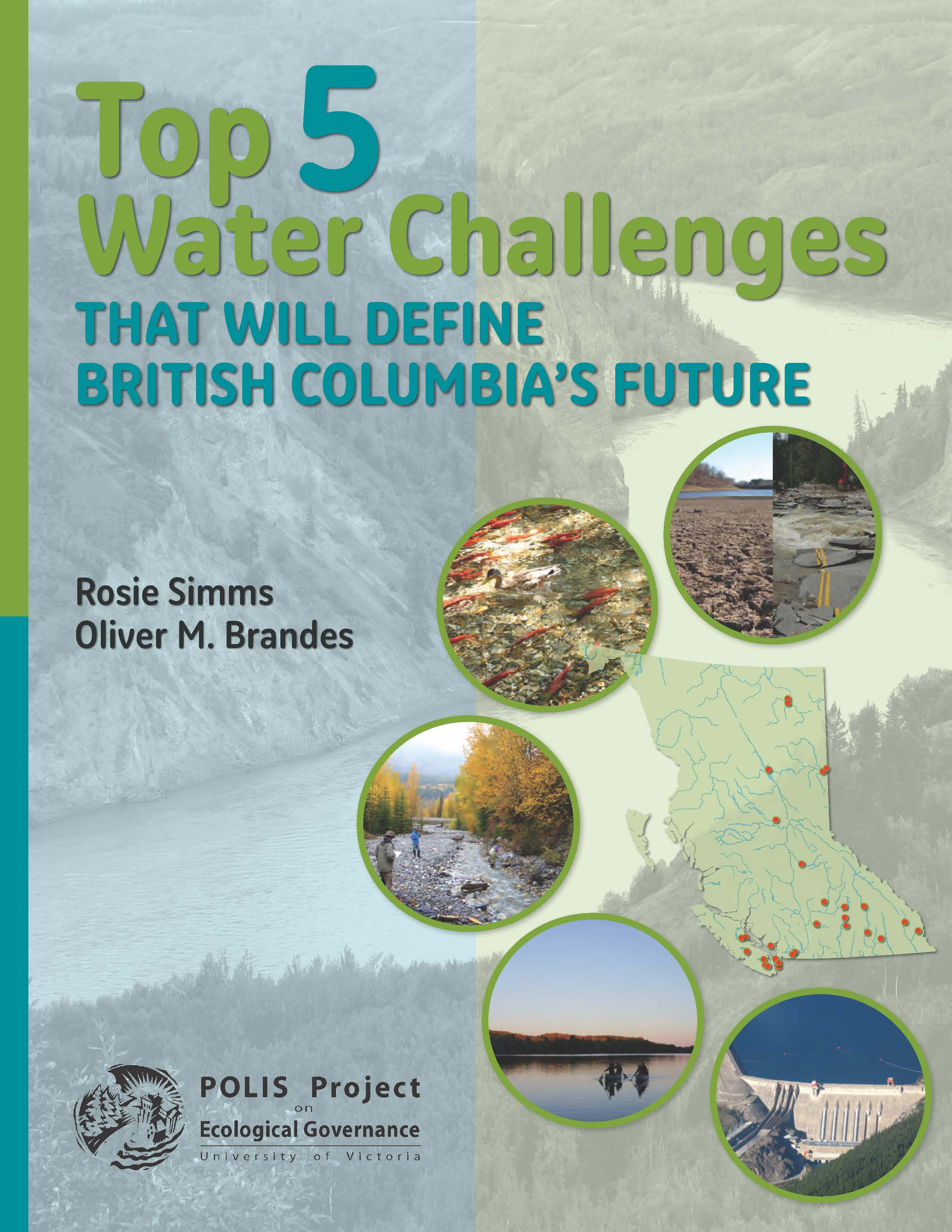NEW REPORT BY POLIS: Top 5 Water Challenges that will Define British Columbia’s Future
Report by POLIS Project urges better B.C. planning on water
Drawing on an extensive review of court and tribunal cases, media reports, and insights from attendance at more than 100 recent events related to water issues, Top 5 Water Challenges That Will Define British Columbia’s Future documents dozens of examples of why and where these five water issues exist: building resilience to droughts and floods; sustaining water for nature; understanding the state of B.C.’s watersheds; protecting water for drinking, swimming and fishing; and reconciling the water-energy nexus.
To Learn More:
Download Report urges better B.C. planning on water, an article published in the Vancouver Sun newspaper on September 14, 2016.
Challenges affect economy: report
 “From a Sunshine Coast community coming within weeks of running out of water last year, to rivers running so low on Vancouver Island salmon have to be trucked upstream, to lakes stagnating with algal blooms, stories are bubbling up across B.C.’s watersheds that deliver a clear message: fresh water is not a limitless resource, and we will have to work a whole lot harder to keep it healthy and safe,” says Oliver M. Brandes, Lead of the POLIS Water Sustainability Project.
“From a Sunshine Coast community coming within weeks of running out of water last year, to rivers running so low on Vancouver Island salmon have to be trucked upstream, to lakes stagnating with algal blooms, stories are bubbling up across B.C.’s watersheds that deliver a clear message: fresh water is not a limitless resource, and we will have to work a whole lot harder to keep it healthy and safe,” says Oliver M. Brandes, Lead of the POLIS Water Sustainability Project.
Oliver co-authored the new report along with Rosie Simms, with support provided by Canadian Freshwater Alliance and a suite of freshwater expert reviewers.
“The report is trying to say British Columbia, British Columbians and in fact many Canadians for a long time haven’t really thought about water issues a whole lot,” continues Oliver Brandes. “Sure they crop up, the drought of 2015 we think about for a bit, we respond and sometimes it’s enough. Sometimes it goes away. And then we forget.”
The study shows that these mounting water challenges have the potential to fundamentally impact the province’s prosperity and quality of life. The report offers potential solutions to create water security and sustainability over the coming years. It is intended to generate productive discussions about solutions and actions among water users, communities and policy-makers.
Select proposed solutions offered in the study include:
- Plan in advance. Ensure capacity exists for local governments to develop community climate adaptation policies and practices, including drought and flood response plans.
- Use the law to protect water for nature. Establish a precautionary minimum environmental flow standard for streams, rivers, and aquifers.
- Collect consistent data. Require all licence holders to monitor and regularly report on their actual water use and water quality and quantity parameters as conditions of their licences.
- Use legal plans to protect source water. These plans should be implemented first in high-risk watersheds and aquifers such as watersheds with regular boil water advisories, or with high levels of development.
- Address water issues in all energy developments. For example, strategic planning processes should be developed for run-of-river hydro projects focused on cumulative and individual project impacts.
 “When you take stock of all the examples of water issues emerging across BC’s watersheds, it amounts to a daunting array of complex problems,” says report co-author Rosie Simms, a water law and policy researcher at POLIS. “These challenges also a present a genuine opportunity to collaborate on solutions, including full implementation of the province’s recent Water Sustainability Act through development of robust supporting regulations.”
“When you take stock of all the examples of water issues emerging across BC’s watersheds, it amounts to a daunting array of complex problems,” says report co-author Rosie Simms, a water law and policy researcher at POLIS. “These challenges also a present a genuine opportunity to collaborate on solutions, including full implementation of the province’s recent Water Sustainability Act through development of robust supporting regulations.”
To Learn More:
Download a copy of Top 5 Water Challenges that will Define BC’s Future.
A major element is a series of province-wide maps that illustrate each of the five topics:
- Building Resilience to Droughts and Floods
- Sustaining Water for Nature
- Understanding the State of B.C.’s Watersheds
- Protecting Water Quality for Drinking, Swimming and Fishing
- Reconciling the Water Energy Nexus
Challenges profiled in Top 5 will be discussed at the upcoming 1.5 day forum, “Watersheds 2016: Building Capacity for Collaboration and Watershed Governance in British Columbia” to be held in Vancouver, B.C. from September 30th – October 1st.



